All The Shadow Pandemics
- Dec 13, 2020
- 2 min read
Updated: Apr 3, 2024
The Jiviniti Coalition is drawing attention to a solution for not only the current pandemic, but also future pandemics and the shadow pandemics of hunger, chronic illness, and systemic inequities suffered by many communities of color in the United States and around the world:
A Plant-Based Economy.
Our coalition believes that a plant-forward economy can help end world hunger.
Scientists at the University of Minnesota found that if humans consumed the crops instead of feeding them to animals, the world supply would be enriched by 70% more food, which would adequately support another 4 billion people. The surplus alone would be sufficient to feed more than half the Earth’s population. The United Nations says that 11% of the global population is experiencing hunger because of the pandemic. This means 1 in 9 people around the world are going hungry.
The National Law Center for Women, a Washington D.C. based non-profit, states 1 in 6 Black and LatinX women reported “not having enough to eat” in the past week. According to the Evidence and Network on U.K. Household Food Security, 10% U.K. adults live in marginally food insecure households. India, one of the world’s largest food producers, ironically, is also home to the largest population of hungry people and one-third of the world’s malnourished children. The Global Hunger Index ranks India 102nd among 117 countries. We need our national leaders to pivot towards a plant-based economy so the pandemic and all the shadow pandemics can be dealt with.
The pandemic response by our national leaders has failed women.
Women of the world find themselves in the worst predicament during the pandemic. Women are faced with higher unemployment due to lockdowns impacting the service industry, and sectors deemed “essential” such as health care, contact tracing and recruitment for vaccine trials have mostly fallen upon women too. With children at home needing homeschooling and care, millions of women are on the frontlines helping us fight this zoonotic pandemic. In the U.S., 78% of essential health care and social workers are women. Of the 5.8 million people working health care jobs that pay less than $30,000 a year, half are non-white and 83 percent are women. One million women healthcare workers have been drafted to fight COVID-19 in India — for as little as $40 a month. Most are classified as volunteers, which renders them ineligible for minimum wages and other benefits.








Comments